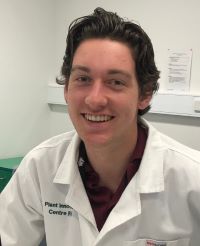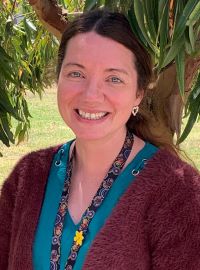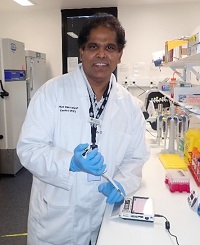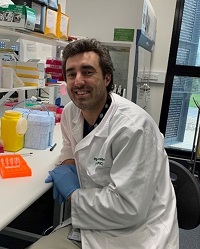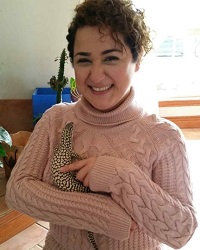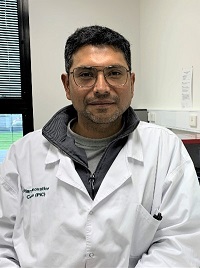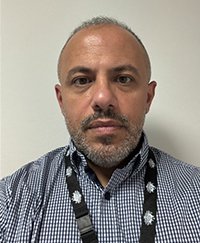Want real-world experience in biosecurity research? The Plant Innovation Centre (PIC) offers a range of opportunities for science students. We provide valuable experience in biosecurity research.
Student scholarships
Want to become a professional scientist? We’ll help you take the next step beyond your undergraduate studies.
At PIC, you’ll get:
- Exposure to one of Australia’s leading science employers
- Access to a cutting-edge biosecurity containment facility
- Time in modern, well-equipped laboratories
- Opportunities to build your network with government and industry
- Real career pathways and job prospects
- Hands-on experience with top scientists in their fields
To join us, you’ll need to:
- Be professional, motivated, and open-minded
- Meet with the PIC team as part of the selection process
- Pass a Federal Police check
- Provide 100 points of certified ID
- Complete an induction and online e-learning modules
- Meet all requirements to work in a Biosecurity Activity Zone
Honours/Masters (MSc)
Ready for your first major research project? Our Honours/Masters co-supervision courses help you develop the necessary skills to become a successful professional scientist.
We offer:
- a $5,000 stipend (payable in 2 x $2,500 instalments)
- Hands on research experience
- the opportunity to help develop your network
- early career experience.
You'll gain the skills you need to succeed — and the confidence to lead your own research in the future.
Interested?
Reach out today: PICteam@aff.gov.au or speak to your university Honours/Masters coordinator about co-supervision opportunities.
Completed Honours or Masters? Or already working in the field? You may be eligible for a co-supervised PhD with the PIC via one of our partner universities.
This is the highest level of study in Australia and can open the door to:
- further employment
- better wages and conditions
- gain independence to work on your own research interests
- earn industry recognition for your expertise.
You'll tackle real-world biosecurity challenges, protect Australia's agriculture, and develop innovative scientific solutions.
At the end, you will submit a thesis demonstrating your invaluable contribution and earn the title of Doctor and make a lasting impact on science.
You will develop innovative solutions to real-world biosecurity problems and help protect our country from dangerous exotic pests and diseases.
As well as the benefits above, we offer:
- a scholarship of $35,000 (tax free) per year
- up to $25,000 per year to attend conferences and build your professional network.
- the option to work 1 day per week to earn extra income.
Your university will provide all other financial support (for example, study fees) via a Research training program fees offset scholarship through the Department of Education.
Interested? Contact the PIC team today: PICteam@aff.gov.au or speak with your university PhD coordinator about co-supervision opportunities.
Completing undergraduate studies?
Apply for our University Vacation Employment Program (UVEP) here.
If you have a keen desire to work in plant biosecurity and a strong academic record with professional references, please get in touch with us: PICteam@aff.gov.au
Discover your future in science on our website.
Meet our scientists
Thomas Farrall, PhD candidate, University of the Sunshine Coast and Plant Innovation Centre
I completed a University Vacation Employment Program as a student. After uni, I worked as a molecular researcher with the PIC. I took the opportunity to further my scientific knowledge and start my PhD studies. My enthusiasm for new technologies drives me to improve our ability to detect diseases. The focus of my PhD is developing cost-effective third-generation sequencing pipelines for plant virus detection.
Dr Adrian Dinsdale, Director, Plant Innovation Centre
I have been a part of the PIC team since 2018 and have extensive experience in industry, academia, and state and federal government. I provide strategic direction for the team and ensure we align with the department’s priorities. I also engage with other scientific institutions and identify and secure resourcing opportunities. What I love about my job is the opportunity to get involved in interesting and amazing science. I also enjoy the applied nature of our work. Outcomes from our research result in real improvements to Australia’s biosecurity system.
Dr Sonia Fiorito, Assistant Director, Plant Innovation Centre
I completed a PhD in plant molecular biology and joined the department as a Biosecurity Officer. I have since worked in the PIC as a Plant Pathologist and Plant Scientist. Part of my role is screening medium-risk plant material. My career journey has helped me appreciate the department’s role in safeguarding our nation from animal diseases, plant pests and pathogens. I am also proud to work with and lead a dedicated team of scientists. Our work focuses on trialling new and emerging technologies. This helps improve our diagnostic capabilities and treatment options.
Dr Shamila Abeynayake, Senior Scientist, Plant Innovation Centre
After completing a PhD in plant molecular biology I undertook post-doctoral studies in Europe. I joined the PIC as a molecular scientist. I develop innovative projects for biosecurity, such as DNA barcode sequencing. It allows rapid identification of invertebrate pests using MinION technology. I also supervise and manage projects. I love working at the PIC. It has a supportive team environment and provides an opportunity to develop novel solutions that protect Australia’s agricultural industries.
Dr Frank Bedon, Senior Scientist, Plant Innovation Centre
As a plant lover, I studied plant science throughout my education and career. I am particularly interested in the emergence of new molecular biology techniques. These allow me to research and publish new developments in plant science. As part of the PIC team, I am leading innovations into the field of molecular diagnostics using the latest CRISPR-Cas technology. I enjoy helping protect our plant-based economy and beautiful native plants.
Dr Sharareh (Sherry) Heydari, Molecular Research Scientist, Plant Innovation Centre
After completing my PhD in plant molecular biology, I joined the PIC as a Molecular Scientist in 2021. My work involves developing diagnostic assays for detection of exotic seed-borne pathogens that are of biosecurity concern. What I love the most about my work is that it allows me to carry out research that is impactful and contributes to strengthening Australia's biosecurity.
Dr Matias Silva Campos, Molecular Research Scientist, Plant Innovation Centre
I joined the PIC after completing my PhD research in molecular techniques on the diagnostics of plant pathogens. I now focus on developing new detection tools for exotic seed-transmitted pathogens. I love being part of a team that is at the forefront of Australia’s preparedness for emerging threats to the agricultural sector. Also, the amazing and experienced team makes PIC a unique workplace. I am learning new skills and applying all my knowledge.
Dr Nawar Shamaya, Molecular Scientist, Plant Innovation Centre
My background is in plant molecular biology and genomics. Previously, I managed lab operations at Monash University, specializing in molecular biology techniques and bioinformatics. I have contributed to various projects, including invasive weed genome scaffolding. At PIC I contribute to biosecurity innovation by developing advanced techniques for research and practical applications. Passionate about molecular diagnostics, I seek to enhance biosecurity measures and agricultural sustainability through innovative solutions.
Submit a project idea
We welcome project suggestions related to plant disease and virus detection, identification and management. Submit your idea via PICteam@aff.gov.au

